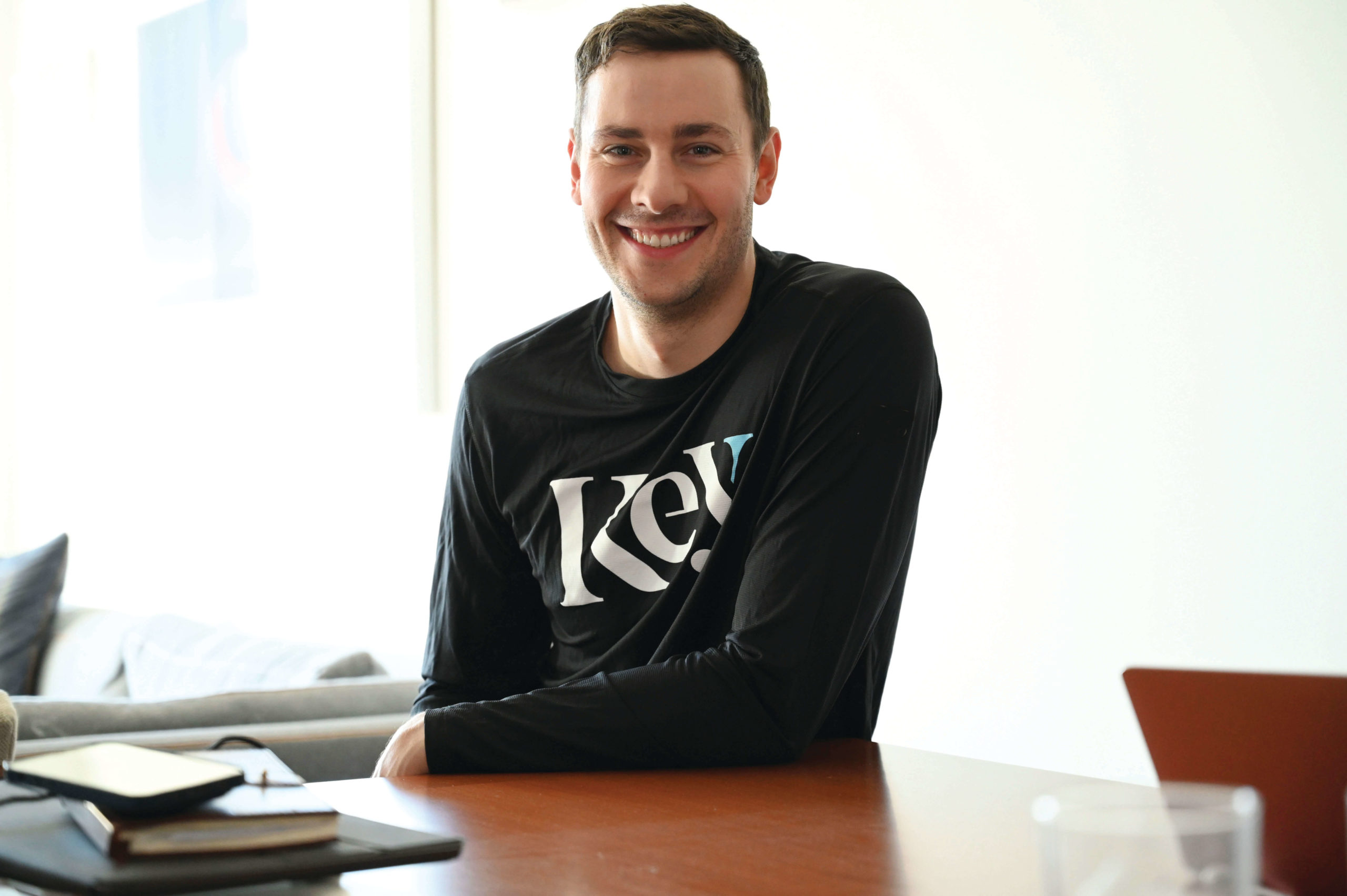
Key’s tagline is “Own real estate. Not a mortgage.”
The innovative Toronto-headquartered proptech launched in 2021 with a co-ownership model that makes homeownership accessible without needing to qualify for a mortgage or save for the typical 20 percent down payment.
Key provides the opportunity to co-own a home to live in and build equity from day one, with a small down payment from 2.5 percent of the home’s value, without having to take on a mortgage. Key aligns real estate investor capital with resident capital to underwrite the cost of homeownership, making it more affordable for residents.
The first-of-its-kind model helps people get on the property ladder decades faster and earlier this year they raised a $11 million seed found led by Luge Capital.
Fintech.ca sat down with co-founder and president Daniel Dubois to learn more about the platform and where they are headed next.

What is Key?
DD: Key is a real estate technology company that’s developed the world’s first all-digital, on-demand homeownership platform. We’ve created a third, hybrid option for Canadians beyond homeownership or renting. Our mission is to make it possible for everyone to prosper from real estate. We do that through a tech-enabled co-ownership model that makes homeownership and equity building accessible for everyone years sooner and empowers property owners to offer a better way into homeownership for consumers.
How exactly does it work?
DD: Key’s co-ownership model makes homeownership accessible without needing to qualify for a mortgage or save for the typical 20 percent down payment. Key’s technology platform and business model provide a frictionless opportunity to co-own a home to live in and build equity from day one, with a small down payment and no need to commit to a mortgage. Key aligns real estate investor capital with resident capital to underwrite the cost of homeownership, making it more affordable for residents.
We partner with property owners and investors to secure suites in premiere buildings. Aspiring homeowners can choose one of our available suites to co-own and live in. Our institutional investors, property owners and investors supplement the cost of ownership to make it affordable. Monthly payments are comparable to market rent, with a part of the payments serving to increase home equity over time. Our co-owners’ investments grow as real estate appreciates.
We also make the experience of co-ownership seamless for property owners and residents with our app. Residents can browse available suites, apply for co-ownership, make payments, manage equity and more all in one place. The entire process is so streamlined that we had a prospective owner-resident sign up from her parked car in 15 minutes!
For property owners, Key’s digital platform simplifies the process of managing tenant background and credit checks, monthly payments, property management, and more all in one place. Some of the other benefits Key provides to property owners include higher quality tenants who think like owners and share in repair + maintenance costs, reduced vacancy and operating costs.
What is the problem that needs solving in real estate?
DD: For many North Americans today, homeownership is an impossible goal, and the real estate model has not evolved quickly enough to solve this generational issue.
It takes an average of 27 years for the typical home buyer to save for the recommended down payment in Toronto, and 35 years for Vancouver. Tighter lending criteria and higher interest rates on mortgage loans are making it even more challenging for aspiring homeowners. COVID-19 has made the situation worse, leaving thousands of condos vacant across major Canadian cities while demand for homes skyrockets. This isn’t good for the property owners or aspiring homeowners. It’s a two-sided problem and Key delivers powerful benefits to both the aspiring owner-residents and the property owners.
Many industries need financial innovation so why did you select real estate?
DD: The inaccessibility of homeownership is an important generational issue that needs to be addressed and innovation is central to fixing it. That’s why we started Key – to be part of a much-needed solution, first in Canada and then globally.
We also see opportunities to deliver significant efficiencies and value to property owners. With Key’s tech-enabled co-ownership model, property owners can attach easily to our platform and benefit from offer configuration, automated resident onboarding and payments, and rich monthly reporting.
Property owners also benefit from better residents with Key. As co-owners, the residents are incentivized to treat the home like their own, which makes it easier and lowers the risk for property owners. The owner-residents also stay longer and share pro-rata in repairs and maintenance, which delivers lower OPEX and vacancy for property owners.
How is Key innovating from a fintech perspective?
DD: We’re innovating in a number of ways with our patent-pending platform, starting with a digital description of every home with equity and debt ledgers representing two or more co-owners. This benefits both the property owners and owner-residents on Key’s platform.
Next, we’ve integrated the ecosystem of fintechs and banks to automate resident vetting, onboarding, and financial transactions. Then, we codify the co-ownership contract and use a rules engine to compute monthly ownership positions and payment obligations from occupancy costs to shared maintenance costs.
We also use big data to compute monthly valuations of every home and apply that to ongoing purchases of home equity. And we’ve made all of that super easy to use from your phone, so owner-residents can become a homeowner in minutes and see where they are with respect to the market at all times. This also streamlines things for the property owners on Key’s platform by providing a consolidated and fully digital dashboard of all their properties.
Where did the idea come from and are there any other examples of similar programs?
DD: After building and selling two venture-backed companies in the sharing economy, I was working for Airbnb and thinking about how a sharing mindset could help address the inaccessibility of homeownership. At the same time, my Co-founder Rob Richards was leading Plaza Ventures, one of Canada’s top venture capital firms. He was thinking about how technology and innovation could positively impact the accessibility issue and also deliver improved OPEX and efficiencies to real estate developers and property owners. We were introduced by a mutual friend and quickly discovered our shared passion for creating a model that would enable more aspiring homeowners to start owning years sooner while also benefitting property owners and making the communities we’re part of stronger.
Key is unique in that it offers a third, hybrid option for Canadians aside from homeownership or renting through co-ownership. There are other companies that offer fractional homeownership, real estate investment, co-living options, etc. but none of them provide the ability for someone to live in their own co-owned suite without needing to qualify for or committing to a mortgage
while building equity.
Who are you targeting?
DD: For consumers, Key is making the dream of homeownership a reality again for people locked out of owning. As home prices continue to rise in Canada, the dream of homeownership is getting further out of reach for Canadians. New data (from Abacus) shows the undeniability as 96% of Canadians believe homeownership accessibility is a problem in Canada and nine in 10 aspiring homeowners feel locked out of ever owning a home.
Our community of owner-residents is representative of how the “missing middle” has become the “missing majority” of people unable to own. Our owner-residents range in age from 24 to their mid-fifties. 86% of our Owner-Residents are first-time homeowners.
They come from diverse backgrounds and professions, including accountants, software developers, a teacher, social worker, architect, three entrepreneurs, a nurse, a lab technician, and several newcomers to Canada, along with people working in the finance, hospitality, and entertainment industries.
For the properties on our platform, Key’s clients include leading developers, a real estate investment trust (REIT), and businesses and individuals who own multiple residential properties. These property owners were attracted to Key’s innovative model for a number of reasons, including our ability to attract better tenants who are co-owners and have a vested interest in looking after the home. Key’s approach also delivers a lower OPEX and lower vacancy rates to property owners. Plus, the property owners are improving the communities they’re part of by helping more Canadians get on the property ladder years sooner.
The Key tagline of Key is “Own real estate. Not a mortgage.” What does this mean and how does Key deliver on it?
DD: Key’s model enables aspiring homeowners to have a place to call home and start building home equity without needing to qualify (or commit to) a mortgage.
What markets are you in and do you plan to expand to the US?
DD: Key launched in Toronto in 2021 and we have suites available in six premiere condominiums and neighbourhoods, with a growing community of owner-residents who are now enjoying the financial and social prosperity that comes with co-ownership.
We launched in Alberta in June and we are expanding into another Canadian market this fall.
The U.S. is a priority market for us. We have our first launch there this fall. We have also met with developers in New York, Miami, and Los Angeles who share our vision. The National Association of Realtors are investors in Key today.
What is the longer-term vision for Key (next 3-5 years)?
DD: Our vision for the next three to five years is we want to help people get on the real estate ladder faster than they can today.
We also want to help property owners evolve their approach to real estate in ways that will differentiate their offering, improve their net operating income and enable them to make the communities they’re part of stronger by helping more people get on the property ladder.
We will continue to expand in our current markets and initially focus on North America. Long term, we hope to expand to major metropolitan cities around the world that are experiencing the same multi-residential housing challenges and needs. We have met with developers in major cities around the world who share our belief that this model is desperately needed.


Leave a Reply